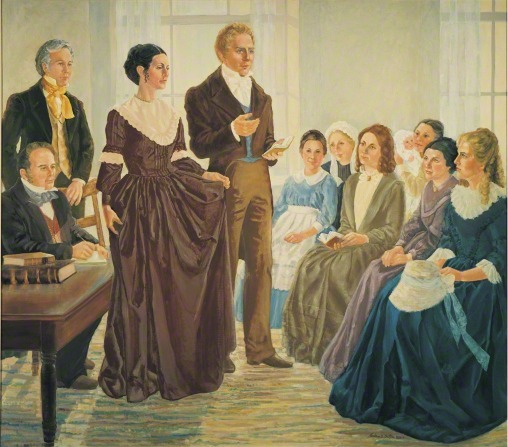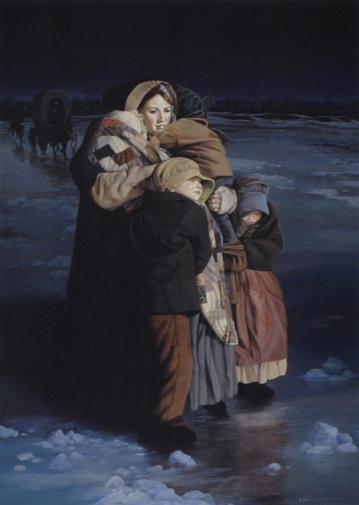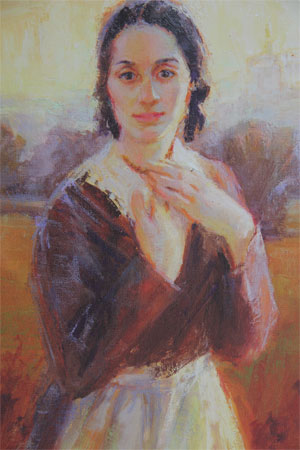
 Emma crossing the Mississippi in the middle of winter
Emma crossing the Mississippi in the middle of winter
We honor Emma as the first president of the Relief Society—an Elect Lady—Mother in Israel. These titles were given her by the Lord and carry a peculiar meaning for a peculiar people.
Her mission was unique and her sacrifice unparalleled. She labored in the heat of the day to plant the vineyard we are now called upon to tend. Great and eternal are the fruits of those labors, but bitter as gall was the nectar in her cup.
Emma was with Joseph when he went to the Hill Cumorah. She waited with the horse and carriage for him to bring the sacred gold plates—she saw no angel. She would serve for a time as his scribe as he translated, but she never viewed the plates. One time she felt their outline and felt the metallic places with her thumb through the cloth. She testified, “I know the Book of Mormon to be of divine authenticity!” For that testimony she suffered the loss of parents and friends. As violent mobs drove the Saints from place to place she would bury six infants in three states. She would know the agony of betrayal by trusted friends and fearful flights in driving rains and freezing snow.
She, who had such pride and longing for respectability would visit her husband in Liberty Jail to comfort him and make arrangements to have clean clothing brought to him; she did this just before she fled the state of Missouri with their four small children in the face of Missouri Governor Boggs’ Extermination Order. She carried with her Joseph’s precious papers, and the manuscript of his Inspired Translation of the Bible, crossing the frozen Mississippi on foot.
No wonder, then, when she was elected president of the Relief Society, she chose as her counselors Elizabeth Ann Whitney, who was the first to receive her in Kirtland, Ohio, and Sarah M. Cleveland, the first to receive her in Quincy, Illinois. Here, too, were women who had labored in the heat of the day, and she knew their loyalty and faith would not waiver. When the Key had been turned and knowledge and intelligence began to flow down upon the women of the Church, these women magnified their callings through selfless service. Ministering to the sick, feeding the poor, clothing the naked and admonishing all to be pure and virtuous before the Lord, they exemplified the meaning of the title “Mother in Israel.”
There was immediacy in their challenge to “be at the post” for, they said, “Now is the time when all must live by faith or fail. . . .The powers of darkness are loose upon us . . . all must be faithful or be overcome.” (Relief Society Minutes, LDS Archives). The burden of Emma’s messages to the sisters in those days was “Unity, Purity, and Charity.” (ibid). I wonder what she would say to us today.
Can you picture her?: Tall, of noble stature, with a dignified demeanor and benevolent countenance, her lovely dark hair very neat and her brown eyes aglow. Our modern Church buildings would thrill her! If she were seeing them she might recall that in 1836, hundreds of men and women crowded into the dedication of the Kirtland Temple, and that in 1842, a few women met to organize the Relief Society—but by the fall of that same year, more than a thousand women had joined. One of the wishes of her heart in those days was to have a building large enough for all to meet together so that she could present the officers for sustaining. What would she say of the worldwide Relief Society with millions of members speaking dozens of languages, with closed-circuit TV carrying instant viewing to chapels all over the globe?
With her usual candor she would surely remark that this society is indeed doing something extraordinary! In that first Relief Society meeting when she said, “We expect extraordinary occasions and pressings calls,” none had any notion how far-reaching and extraordinary those occasions and calls would be. But no one would have been surprised at the effectiveness of the Relief Society women organized to serve “to the utter-most” (R.S. Minutes, LDS Archives) under the priesthood of God. One could justifiably suspect that President Kimball’s maxim, “DO IT,” had its earliest nurturing in the spirit of those tireless sisters whose compassionate hands were never idle.
 In a blessing Emma wrote for herself when Joseph sent her word that he had not time to write as he would like, but if she would write out the desires of her heart, he would sign it, Emma expressed what, to me, represents the essence of her character. As we review this blessing, notice how the spirit of Emma’s desires is embodied in the present work of the Society. She asked that: “I may be able to comprehend the designs of God when revealed through his servants without doubting. To honor and respect my husband as my head and by acting in unison with him retain the place which God has given me by his side.” (Emma Hale Smith Blessing, 1844. Community of Christ Archives, Independence).
In a blessing Emma wrote for herself when Joseph sent her word that he had not time to write as he would like, but if she would write out the desires of her heart, he would sign it, Emma expressed what, to me, represents the essence of her character. As we review this blessing, notice how the spirit of Emma’s desires is embodied in the present work of the Society. She asked that: “I may be able to comprehend the designs of God when revealed through his servants without doubting. To honor and respect my husband as my head and by acting in unison with him retain the place which God has given me by his side.” (Emma Hale Smith Blessing, 1844. Community of Christ Archives, Independence).
Emma believed in mother-training and desired to bring up her children so that they would be “Useful ornaments in the Kingdom of God.” (ibid). She desired self-understanding and improved relationship with all those who would be touched by her presence.
Physical and mental health were important to her and she saw “prudent living” as the sustaining principle through which one gained “a cheerful countenance” and “the ability to perform all the work I covenanted to perform in the spirit world.” (ibid). She had a deep and abiding faith in Jesus Christ and often acknowledged His comforting presence. After her flight from Missouri she wrote, “Was it not for the direct interposition of divine mercy, I am sure I never should have been able to endure the scenes of suffering that I have passed through” (Emma Smith Bidamon to her son, Joseph Smith III, 1869, C of C Archives).
With poignancy, I quote these words of her blessing: “I desire that whatever may be my lot through life, I may be enabled to acknowledge the hand of God in all things” (ibid). Emma was the first and only woman in this dispensation to receive initial women’s temple ordinances from the Prophet Joseph Smith. After she received it, Joseph instructed her to administer it to other women, and she did. Until women were included in this endowment the fullness of the priesthood was not established. All women in this dispensation who receive certain sacred blessings in the temple do so through Emma. How surely the adversary tried to destroy this binding link with heaven, but he could not prevail. Emma’s struggles in this conflict are legendary; but few comprehend the significance of her position, or the fact that her calling and election was made sure in September 1843.
How great is the contribution of Emma to the Restoration! In the midst of fiery persecution and almost unsurmountable troubles, she labored to help set the foundation of the gospel on the earth. On 28 June 1830, her baptism was disrupted by a mob, and just fourteen years later, on 27 June 1844, her husband’s life was ended by assassins. From the blithe young girl who rode away with her handsome prophet to the Elect Lady and Mother in Israel, to the weary, sad-eyed woman with bent shoulders and crippled hands, Emma was a woman among women. If we look closely, perhaps each of us may find a reflection of her in ourselves.
